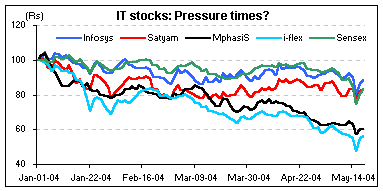Indian IT stocks have had a bad, or in soft terms, 'not-so-good' 2004 so far. While there are factors like the outsourcing backlash in the United States (the largest market for these companies) that have raised doubts about faster volume growth, the overall uncertainty in the Indian stock markets has also cast its shadow on these stocks (see graph below).

There has, indeed, been no fundamental shift for companies from the Indian software sector. In fact, these have posted impressive numbers for the full year ending FY04, carrying on the good work for the last two quarters (3QFY04 and 4QFY04).
These two quarters, specifically, saw billing rates stabilise and volume growth improving. What's more, companies like Infosys, Wipro and Satyam also managed to increase contribution from high value services (like package implementation and systems integration) to their total revenues. For example, contribution of 'new' services for Infosys increased from 35.0 per cent of consolidated revenues during 4QFY04 to 36.3 per cent during 4QFY04.
This move towards high-end services has not only helped these software majors cap the decline in overall billing rates, it has, more importantly, brought their managements more closer to the clients (as these services have a higher onsite content, at least to start off with).
As far as the outsourcing backlash is concerned, we would like to reiterate that while this may hurt valuations in the short to medium term, over the long term, economic sense is likely to prevail.
This is because, as global corporations, in their aim of becoming more competitive, would continue to outsource their non-core operations to low cost countries like India that also provide benefits of high-quality and timely execution.
There is another fact that is likely to benefit Indian software companies and seems to be missing the eye. It is the possibility of a rise in the US interest rates, which could strengthen the US dollar or, more simply, lead to a depreciation in the value of the Indian rupee.
This would have a consequent effect to on the bottomline of Indian software companies that have been hurt, over the past two years, by the appreciation of the rupee.
For instance, the management of Infosys is expecting a rupee/$ rate of 43.4 (an appreciation of around 5 per cent from FY04's average rate of Rs 45.7) for FY05 and has taken this into account to project earnings per share of Rs 224 for the fiscal.
If we remove this effect, i.e., we keep the exchange rate constant at Rs 45.7 per $, the EPS jumps to Rs 267 (implying a whopping 44 per cent growth over FY04 EPS).

As far as valuations of domestic software majors are concerned, most of them are trading at attractive valuations, but only from a two- to three-year (FY06 onwards) perspective. While valuations might be affected in the short term due to eventualities (read, backlash in the US), fundamentals are likely to play a more important role in the long-term.
Thus, the need of the hour for investors (and those waiting to be) is to invest with a long-term horizon. Also, they need to invest in only those companies that have visionary managements and sound business models. Returns will, then, take care of themselves.
Equitymaster.com is one of India's premier finance portals. The web site offers a user-friendly portfolio tracker, a weekly buy/sell recommendation service and research reports on India's top companies.





